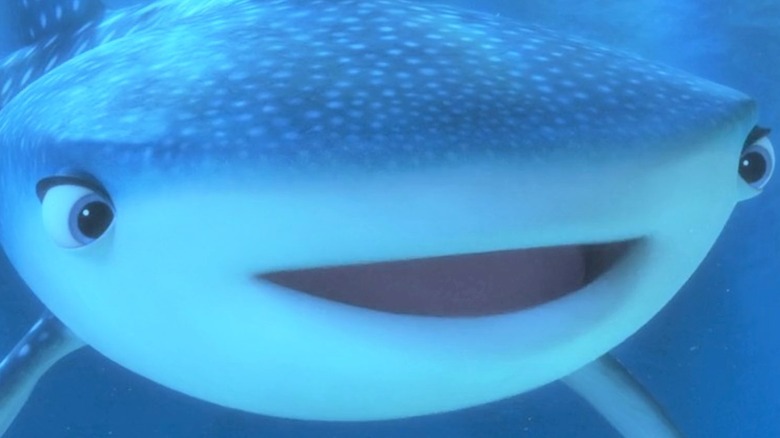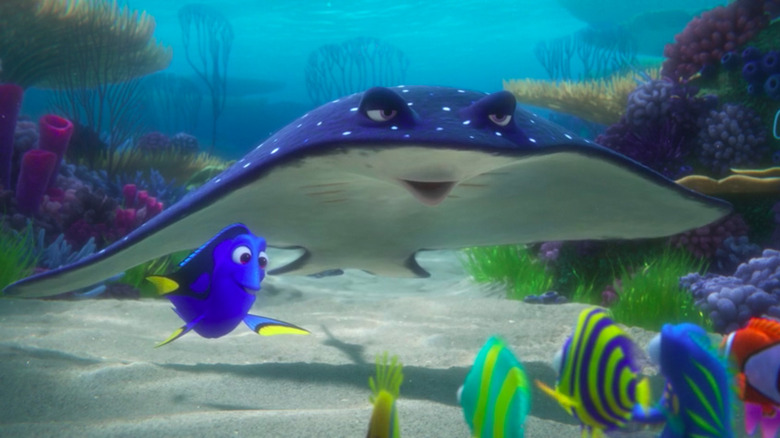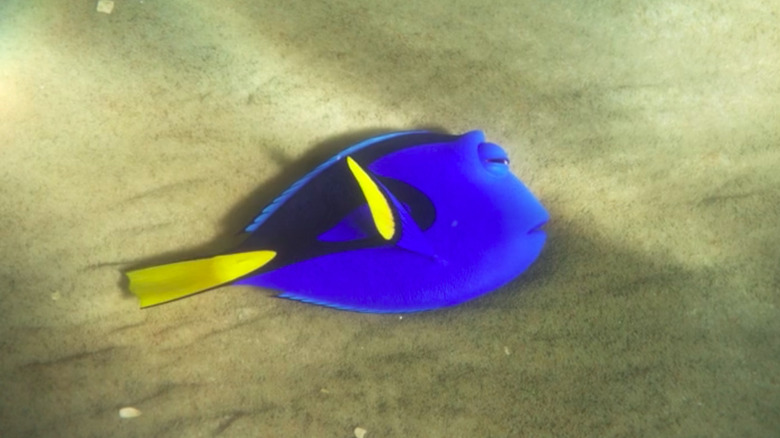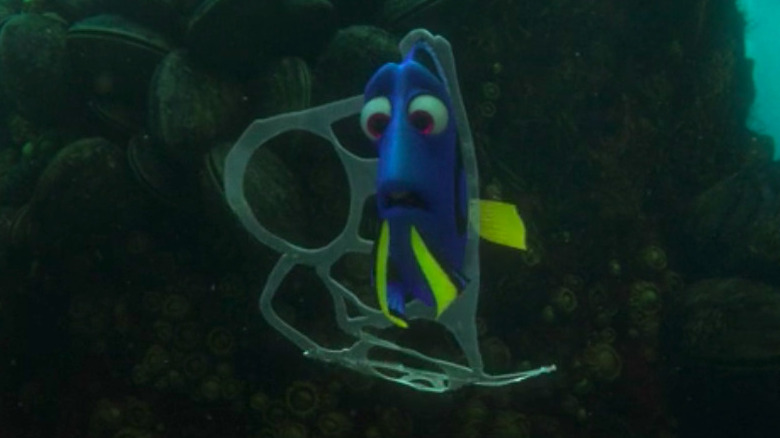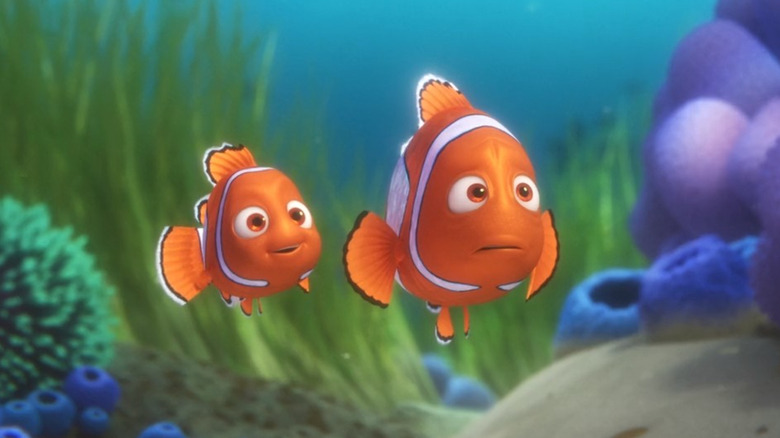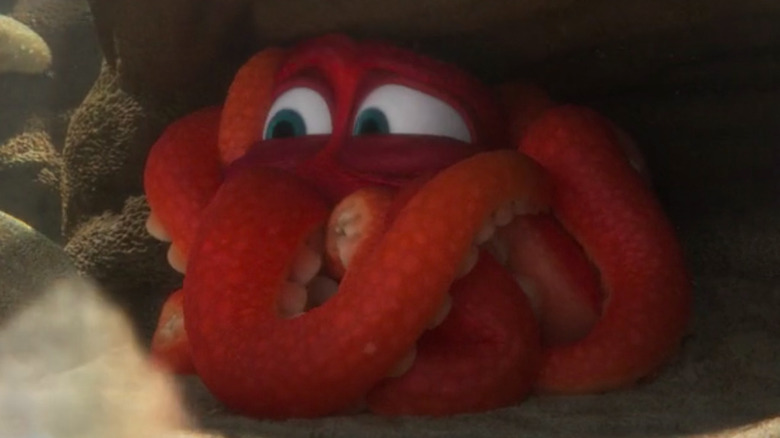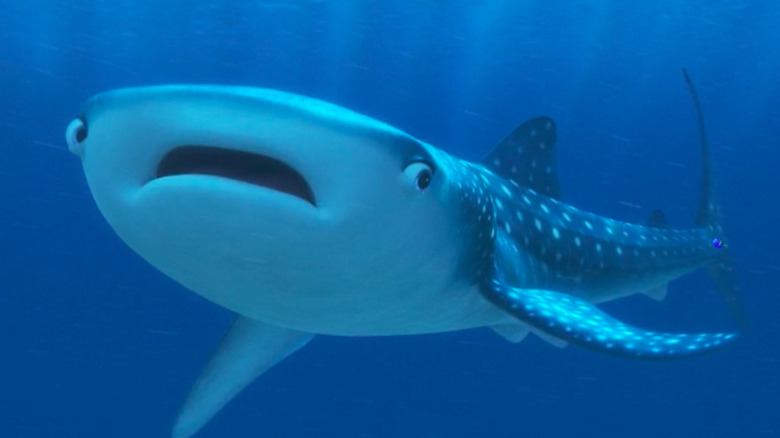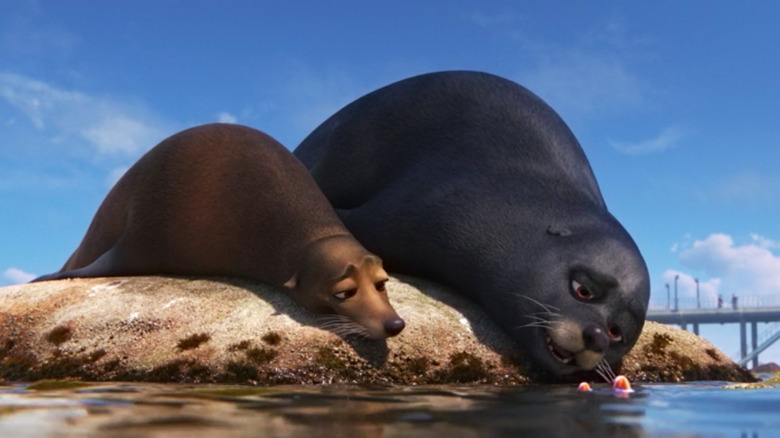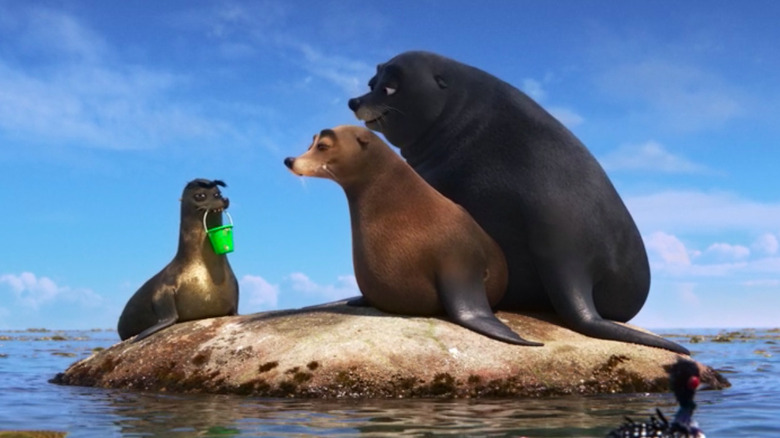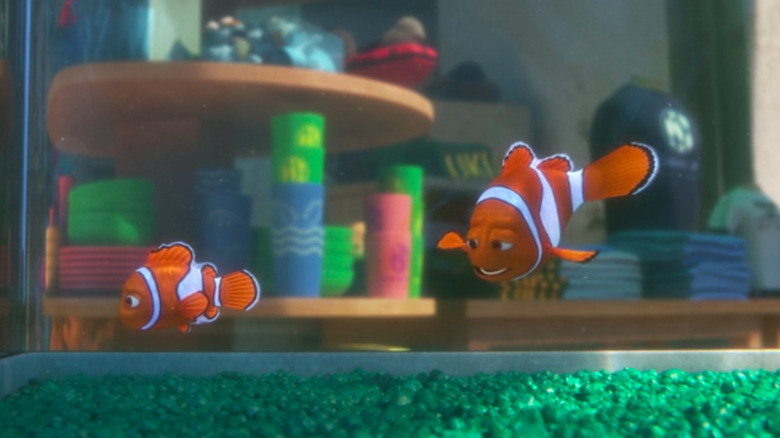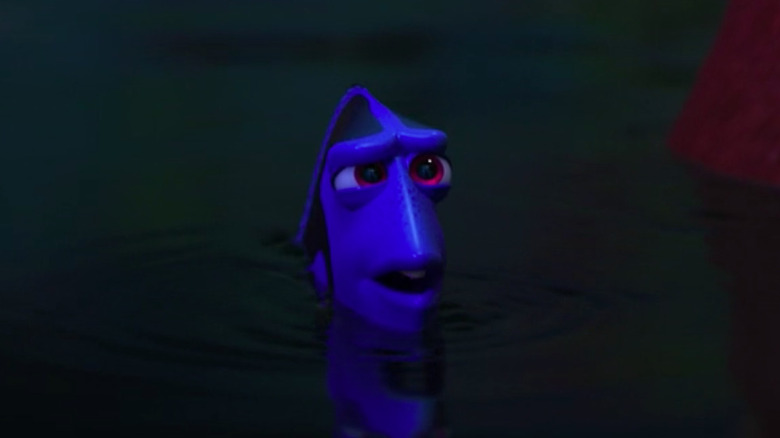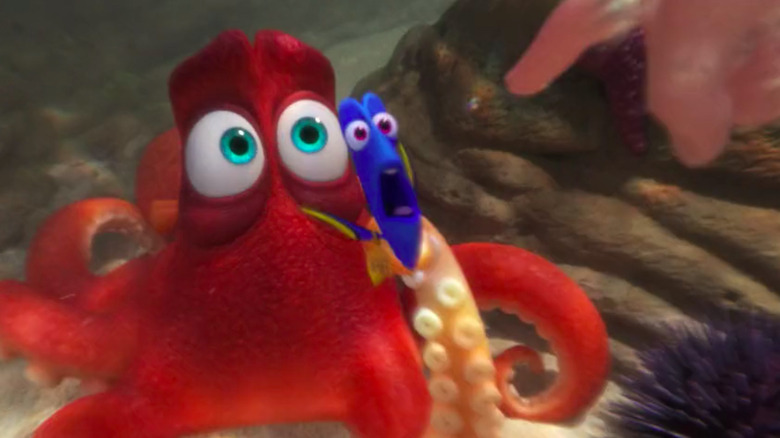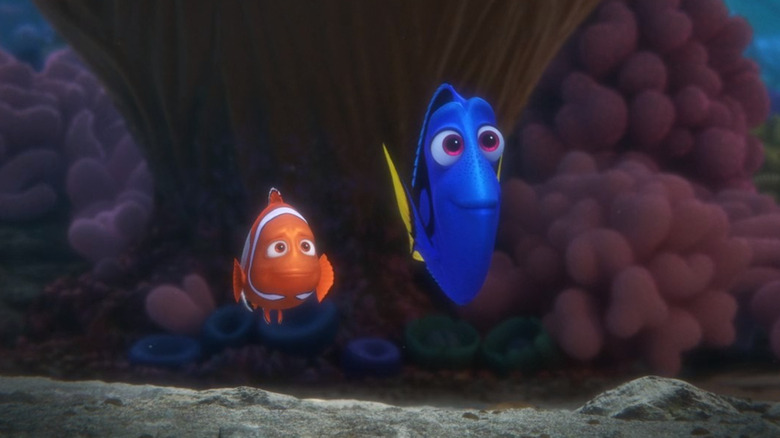Things Only Adults Notice In Finding Dory
The forgetful Pacific blue tang Dory (Ellen DeGeneres) swam into fans' hearts in 2003's "Finding Nemo," but it wasn't until 13 years later that we learned her backstory in "Finding Dory." After they forged a fast friendship in the previous film, the sequel finds Dory living with Marlin (Albert Brooks) and Nemo (Hayden Rolence) on the reef, but while Dory has become comfortable in her new community, something's still missing — if only she could remember what.
When Dory unexpectedly has a memory of her parents that reveals they live in the "jewel of Morro Bay, California," she insists on traveling across the ocean to find them and enlists Marlin's help to do it. The nebbishy clownfish is reluctant at first, but when Dory tells him how much she misses her family, Marlin agrees to go on yet another dangerous journey.
The story of "Finding Dory" is a clever and touching inversion of "Finding Nemo," in which Marlin and Nemo help Dory search for her long-lost parents just like she once helped Marlin search for his captured son. Along the way, they have an amazing adventure that involves encounters with all kinds of sea creatures, from a terrifying giant squid to an adorable group of otters. While the touching story and its lovable critter characters make for a movie the whole family will enjoy, it also includes several elements and plot points are likely to sail over kids' heads. Here are the things only adults notice in "Finding Dory."
It's surprising Dory remembers where babies come from
As a fish suffering from short-term memory loss, Dory doesn't often recall new information after a second or two. Consequently, it's not always clear what she'll remember or why. Dory remembers and relies on Marlin and Nemo in "Finding Dory," yet there are plenty of other things that she doesn't retain, including memories of her own family. So when Dory accompanies Nemo's class on a field trip and is asked why she believes she has a family even though she can't remember them, it touches off a conversation about mothers and fathers — a conversation that Dory soon forgets she's having and then misinterprets as being about biological reproduction.
Given her go-with-the-flow attitude, Dory is willing to tell the class about the birds and the bees, even though she's surprised the lesson is included in the curriculum for such young fish. Fortunately, the kids' instructor, Mr. Ray (Bob Peterson), stops Dory's foray into teaching sexual education before it can start. Although kids probably won't understand what Dory was about to explain, adults may find themselves wondering why Dory can remember where baby fish come from and how she learned in the first place. After all, the film's opening moments make it clear that Dory was separated from her family very early in life, making her too young to have found out from her parents. It's also unlikely she went to school and learned there. This leaves Dory's knowledge of fish reproduction a mystery.
Those are some really morbid kids
When Mr. Ray warns Nemo's class about the undertow generated by the stingray migration he's taken them to witness, it triggers a buried memory of a warning Dory's parents used to give her. Dory becomes so distracted by the unexpected recollection that she's pulled into the stingrays' path, and the impact knocks her out. Mr. Ray and the class retrieve Dory, but she remains unconscious for at least a few minutes, and when she opens her eyes again, the group is hovering over her. This could be interpreted as concern, but instead of expressing joy or relief upon Dory's return to consciousness, a surprising number of the young fish express disappointment. That's right, while Nemo and Mr. Ray are worried about Dory, most of the students are rooting for her demise.
It's a brief moment that will probably go over kids' heads, but it may leave adults startled at just how morbid and callous the other students in Nemo's class are. After all, they all know Dory and seem to like her. Why would they want to see her meet a premature end? It's possible the little fish just want to prove their bravery by proclaiming their desire to see a dead body or don't completely understand what death means. Still, their response is an unexpected demonstration of the movie's tendency to periodically paint children as savage beings.
A nod to a very real problem
"Finding Dory" is engaging family fun that also includes some important messages. Yet, even though the film is set in and around water, the story doesn't have much to say about the concerning state of the ocean or the numerous endangered species that live in it. That said, there's one significant plot point in the movie that speaks to these issues.
After Marlin, Dory, and Nemo make it to the Pacific Ocean, they encounter a huge squid that thinks the trio look like a tasty snack. During a chase through an area filled with submerged cargo containers, one of the rings of the plastic used to hold a six-pack of drinks together ends up around Dory. In the movie, this is a good thing, as Marlin and Nemo get stuck in the rings too, enabling the group to escape together. However, the plastic debris is also a nod to the very real problems the massive amount of plastic in the ocean has created.
Unfortunately, tons of plastic finds its way into the ocean every year, and all kinds of marine animals are severely injured or die after getting entangled or eating it. Although Dory's encounter with plastic in the ocean turns out significantly better than that, many adults will recognize that the inclusion of the plastic rings is not only a convenient plot device but speaks to the issue of plastic pollution.
Why did Marlin bring Nemo on this adventure?
From the moment we meet him in "Finding Nemo," it's clear Marlin isn't the most adventurous fish. And after losing his wife and most of his children in a barracuda attack, he becomes even more risk-averse, to the point where he's even hesitant about letting his only son go to school. Yet his overprotectiveness also causes Nemo to rebel, leading him to get caught and taken away.
While both Marlin's trip across the ocean to recover Nemo and his friendship with the optimistic Dory have enabled him to loosen up a little, Marlin still prefers the safety of home to the excitement of travel. So when Dory decides to venture out to find her parents and requests Marlin's assistance in her quest, it's no surprise that he isn't thrilled. However, it's also not surprising that he eventually agrees, given his quest to find Nemo makes her plight especially relatable to him. What adults may find less understandable but children may not consider are his reasons for choosing to take Nemo with him.
Marlin knows from his first trip across the sea that he and Dory will encounter plenty of danger on their mission. Nemo is a young fish and has already been through a lot in his life, so it's odd that Marlin doesn't consider finding someone to babysit Nemo at home, leaving him safe on the reef until Marlin returns.
Hank the septopus seems to be suffering from trauma
When Dory finally makes it to the "jewel of Morro Bay," the Marine Life Institute, the first fellow ocean dweller she encounters is an octopus named Hank (Ed O'Neill). Hank comes across as cantankerous and impatient, but it quickly becomes clear that his annoyed exterior is hiding a well of vulnerability. Kids will notice that Hank is afraid of the idea of returning to the ocean, perhaps because of whatever happened that left him without one of his tentacles (which, as Dory points out, makes him a septopus), but adults will realize that whatever Hank has gone through appears to have left him traumatized.
Hank is willing to bravely traverse the entire aquarium using his camouflage, along with some questionable disguises, to help Dory as long as she gives him her tag — which grants her a one-way ticket to an aquarium in Cleveland — in exchange. Hank is desperate to find a permanent home in an aquarium. Otherwise, he's afraid he'll be returned to the ocean, a fate that he believes would be a nightmare. Adults will realize that Hank's desire to stay away from his natural habitat suggests something happened to him in the ocean that continues to haunt him, something Hank may require some therapeutic help to truly get over.
Destiny is not a whale
In "Finding Nemo," Dory claims she can speak whale, a declaration that appears to be confirmed when a whale helps her and Marlin get to Sydney, Australia, where Nemo is being kept. Dory's whale language abilities come up again in "Finding Dory," but this time she doesn't talk to a whale — she talks to a whale shark named Destiny.
Dory met Destiny when she was a young fish growing up at the Marine Life Institute, and it seems that it was their exchanges that left Dory with the impression she could speak in whales' native tongue. However, Destiny and Dory seem unaware that it's the second word in the name of Destiny's species that points to the kind of sea creature she really is — an important distinction the movie also fails to make.
So while children may leave "Finding Dory" believing whale sharks are just whales with a cool species name, many adults will know that whale sharks are actually sharks. In fact, whale sharks are the largest fish in the world, and the whale in their name is simply a reference to their great size. Similar to Destiny, whale sharks are actually very gentle and filter feed small animals like plankton, making them much less threatening than many other smaller but toothier shark species.
The movie includes a Wire reunion
Plenty of impressive actors lend their voices to the characters of "Finding Dory." In addition to Albert Brooks and Ellen DeGeneres as Marlin and Dory, Diane Keaton and Eugene Levy play Dory's parents, Ed O'Neill plays Hank the octopus, Kaitlin Olson plays Destiny the whale shark, and Ty Burrell plays Bailey the beluga whale. A pair of famous actors also voice the sea lion characters Fluke and Rudder, actors that kids are unlikely to identify but will leave adult fans of the HBO drama "The Wire" particularly delighted: Dominic West and Idris Elba, two of the TV series' biggest stars.
On "The Wire," West depicted Jimmy McNulty, a detective in the Baltimore Police Department, while Elba portrayed his adversary, erudite drug dealer Stringer Bell. Although both men adopted American accents for the series, in real life, West and Elba were born in England, and they use their natural accents to bring Fluke and Rudder to life. It's a small Easter egg, but fans of "The Wire" will enjoy hearing the two actors together again, even if their reunion happens in a story that has little in common with the HBO show.
Bullying is played for laughs
"Finding Dory" features a number of characters who have physical and cognitive limitations. In addition to Dory, there's Nemo who has an underdeveloped right fin, Destiny who's near-sighted, and Hank who's missing a tentacle. While the movie depicts these characters as brave, resourceful, and endearing, it also includes some neurodivergent characters who don't fare nearly as well. In particular, the film plays the bullying of the nonverbal sea lion Gerald (Torbin Xan Bullock) for laughs, a choice that kids may not question but adults are likely to find disappointing.
While the sea lions Fluke and Rudder are helpful to Marlin and Nemo, sharing information about the Marine Life Institute and helping them gain access to the facility, Gerald is a frequent target of their derision, and they refuse to let him share their coveted rock with them. In their brief appearance in the film, they force Gerald off the rock by screaming "off!" at him, and they play Gerald for a fool by offering to let him hang out on the rock in exchange for his bucket, only to force him off the rock after he gives the bucket up. Although "Finding Dory" champions characters with all kinds of different abilities, because Gerald can't speak for himself, he isn't treated as humanely as many of the rest of them.
With Marlin as his dad, it's amazing Nemo is so confident
Ever since "Finding Nemo," Marlin's had a hard time handling his son's physical disability. Although they referred to it as his "lucky fin," Marlin frequently drew attention to the fact that Nemo's smaller right fin made him a slow swimmer and less physically capable than his peers. And in "Finding Dory," Marlin demonstrates that his old ableist beliefs are still there. This becomes especially obvious when he's introduced to the loon Becky, whose wide eyes, inability to speak, and jerky moves lead Marlin to assume she's not up to the task of helping them.
During their short time with Becky, Marlin interprets everything she does as a mistake that will create problems for him and Nemo. This leads Nemo to become frustrated and accuse his father of making Becky feel like she can't do what they need her to. Of course, Marlin quickly realizes that Nemo isn't really talking about Becky but about Marlin's treatment of Dory and himself. But adults will recognize that despite Marlin's tendency to voice his doubts about anyone with less than typical abilities, including his own kid, Nemo is growing into a strong, smart, and loyal fish who doesn't suffer from many of the hang ups that hold his dad back. While it's not clear if this is because of Dory's influence, a natural part of his personality, or something else, Nemo is becoming confident and adventurous in spite of Marlin.
It's unclear how Dory learned to read
Viewers learned Dory could read English in "Finding Nemo," an ability she used to discover the address in Australia where Marlin would find his son. The irony was that she temporarily forgot she knew how to read but never forgot how to sound out letters to form words. In "Finding Dory," Dory's ability to read plays an even bigger role in the plot, as she frequently has to decipher the signs throughout the Marine Life Institute to make it to her parents' location. While kids and many adults may accept that Dory's reading skills are simply part of the story in both films, some grown-ups are likely to scratch their heads at this odd detail.
Both movies make it clear that it's unusual for a fish to be able to read "human," and even if Dory's parents were capable of reading, it's unlikely that they taught their daughter since, when she left them, they were still trying to educate her about the undertow and how to find her way back home to them. Plus, given Dory's memory loss issues, she would likely have to study long and hard to develop and remember this skill. So it seems that even though "Finding Dory" fills fans in on some of Dory's backstory, there's plenty about Dory's past that hasn't been revealed, including how exactly she became a rare reading fish.
There's a very adult joke involving Hank
When Hank and Dory inadvertently end up in the Marine Life Institute's touch pool, they're both frightened by the grabby hands of the children reaching for them in the water. Hank, however, is especially terrified, and he eventually cowers under a rock, a place he plans to stay forever, seemingly because it's the only place he feels safe in their new environment. Eventually, Dory convinces Hank to make a break for it so they can resume their search for Dory's parents. Unfortunately, they don't make it far before a finger starts reaching straight for them, and when it makes contact with Hank, the octopus spews ink everywhere in response.
Inking is natural behavior for an octopus. When they feel threatened, the animals will let out a large amount of ink with the goal of obscuring their surroundings long enough to get away from whatever they fear. Hank clearly fears people touching him, so deploying his ink makes sense. Yet adults will notice that the movie takes the opportunity to turn Hank's inking into a joke about, um, certain premature problems. After he realizes what he's done, Hank apologizes in a small voice, as if he's embarrassed. Meanwhile, Dory reassures him that it's no big deal and happens to everyone. Yes, even kid-friendly Pixar can't resist including an adult metaphor in their movies once in a while.
The movie emphasizes the value of chosen family as much as biological family
"Finding Dory," with its focus on Dory's quest to find her mother and father, is a story for anyone who understands the power of biological family, and it's one that young children who are still reliant on their parents may find especially resonant. However, adults are likely to notice that the movie recognizes the value of chosen family just as much as it does biological family. Although Dory eventually finds and reunites with her parents, the movie doesn't end there. When Dory realizes Marlin and Nemo are trapped on a truck bound for Cleveland, she pulls out all the stops to get them back in the ocean with her, explaining to her skeptical and scared parents that finding them is vital to her because Marlin and Nemo aren't just friends, they're family.
Just like Dory misses her parents, she misses Marlin and Nemo when they're gone, and they feel the same way about her. This is something many adults can relate to as they move out of their childhood homes, become close with others, and choose to create families of their own. The film's recognition that all kinds of familial relationships are important and valuable is one of the things that makes the film so meaningful to viewers of all ages.
